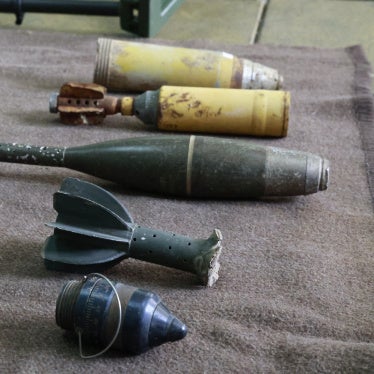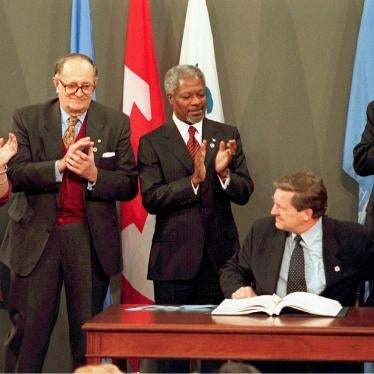Geneva, Switzerland
Thank you for the floor, Mr. President. The ICBL is very pleased to have you in the chair, and we look forward to continuing to work closely with you over the course of the next year. We would also like to take this opportunity to profusely thank Prince Mired for the exemplary job that he has done over the past two years as the President of the Eighth Meeting of States Parties.
Mr. President, delegates,
This will be the most important annual Meeting of States Parties yet. The stakes are high this week, and it is not an exaggeration to say that the integrity of the Mine Ban Treaty is at risk.
There are three States Parties that are in serious violation of one of the core obligations of the treaty-to destroy all stocks within four years-and they have been in violation for nine months. To our knowledge, Greece has yet to destroy a single one of its 1.6 million antipersonnel mines, and Turkey and Belarus have yet to set a new deadline for coming into compliance. While the circumstances are different for the three nations, especially in that Belarus-as it has made clear from the beginning-is dependent on donor support, all must take more urgent and concrete action to resolve their situations and once again re-join the community of states that are observing their obligations.
Other States Parties should express grave concern that all three have been in sustained violation of the treaty and call for (1) accelerated destruction, (2) firm deadlines for completion, and (3) monthly reporting on progress to the President of the Ninth Meeting of States Parties. It appears that all three are now taking their obligation seriously, so other States Parties may not feel compelled to invoke Article 8 on facilitation of compliance and to consider possible sanctions. But these steps-accelerated destruction, firm deadlines, and monthly reporting-seem like the minimum action that should be demanded of these states that remain in violation of the treaty.
How other States Parties treat these violations is as important to the integrity of the treaty as the actions the violators themselves undertake in order to comply. Missing a stockpile destruction deadline is not equivalent to missing an annual Article 7 transparency report deadline, and States Parties should react loudly and with alarm whenever a destruction deadline is missed, or better still, when it appears it might be missed. In this regard, the ICBL strongly supports the Stockpile Destruction co-chairs' proposal for what amounts to an early warning system on this matter.
Equally disturbing is the fact that 15 States Parties are asking for extensions of their mine clearance deadlines. While some requests were to be expected and are justified, in Nairobi at the first review conference, States Parties said there should be "few if any" extension requests. Clearly, many of these fifteen could have made the deadline if they had devoted adequate attention and priority to the problem. Many have paid no attention to the requirement to demine "as soon as possible," and some are now misusing the extension process by asking for unjustifiably long periods.
Two states-the United Kingdom and Venezuela-have not cleared a single mined area in the past nine years. The UK's extension request is by far the worst, not just because it has not even started clearance, but because it is asking for another ten years without any indication of when it will begin or indeed, if it ever intends to begin. The ICBL is recommending that States Parties should deny the UK and Venezuela requests unless they revise their requests and commit to initiating clearance before the ten year deadline.
Again, the integrity of the treaty depends not just on reasonable requests from those missing their deadlines, but just as much on other States Parties reacting properly to unreasonable requests. There can be no rubber stamping of requests. The analyzing group has for the most part done solid work that must be taken seriously. The ICBL has prepared critiques of each request, with recommendations, that we ask States Parties to review carefully. States Parties should feel duty bound not just to vote yes or no on a request, but to ask questions and make comments, which should then be reflected in the final report of the Meeting and taken into account by the requesting state.
The Mine Ban Treaty has thrived in an atmosphere of good will and a culture of cooperative compliance, where States Parties help each other to meet obligations, rather than pointing fingers and condemning those who fail or seem headed to failure. This positive approach should not change. It is vital to the long term success of the treaty. But that does not mean that States Parties should put their heads in the sand on those rare occasions when obvious and easily avoidable transgressions occur, as is now the case with these instances of missed stockpile destruction and clearance deadlines and unjustified extension requests.
The manner in which these things are handled this week will set a precedent for how they are handled in the future. It may also determine the seriousness with which some states treat their obligations. It is crucial to stand up for the integrity of the treaty now, so that it can remain strong in the coming years and decades.
The other area that most demands attention is victim assistance. Many of the VA 26 have presented ambitious objectives to be achieved by the Second Review Conference and some have presented plans to achieve them, but they must be matched with concrete actions and the necessary resources to achieve the plans. With one year left until the Second Review Conference, the VA 26 need to sharply increase their efforts to make the maximum possible progress toward their goals. Donors need to increase levels of assistance to landmine survivors, their families, and their communities.
Mr. President, I would now like to highlight some of the key findings of the 1,155-page Landmine Monitor Report 2008, which the ICBL released on Friday. We appreciate the financial support of 15 States Parties, the EC, UNDP, and UNICEF for this year's edition.
Only one government, Myanmar, made significant use of antipersonnel mines in the past year. We also identified Russia as a user. Non-state armed groups used antipersonnel mines in nine countries, including five States Parties.
The number of recorded casualties from mines and explosive remnants of war was the lowest ever in 2007: a total of 5,426. The true number is no doubt considerably higher. The trend continues in the right direction, but the decrease in casualties was markedly less than in previous years.
More than 8.4 million people received direct risk education in 2007, the highest level ever recorded. But the lack of evidence on the effectiveness of risk education continues to impede efforts to improve performance.
Landmine Monitor recorded global clearance in 2007 of at least 122 square kilometers of mined areas and at least 412 square kilometers of battle areas.
In 2007, donors provided more than $430 million of international funding to mine action. While this was a decrease of $45 million, it constituted the second highest level ever. Mine affected states generated another $117 million in national funding, an increase of $33 million.
From these findings, it is clear that tremendous strides continue to be made in our common effort to combat antipersonnel mines and their lasting effects, despite the daunting challenges we now face in some areas of implementation of and compliance with the Mine Ban Treaty. It is equally clear that much work remains to be done, which will require sustained and even increased efforts by all of us in this noted partnership of governments, NGOs, the ICRC, and UN agencies.
In conclusion, Mr. President, we would be remiss if we did not stress that this is of course a crucial moment in time for another convention, the Convention on Cluster Munitions. Both the letter and the spirit of this new treaty banning cluster munitions are based on the Mine Ban Treaty and the experience of its implementation over nearly a decade. Both weapons, by their very nature, cause far too much human suffering. The Convention on Cluster Munitions holds out the promise of making as significant a humanitarian impact as the Mine Ban Treaty. We urge all 156 States Parties to go to Oslo next week to sign the new ban on cluster munitions.
Thank you.








